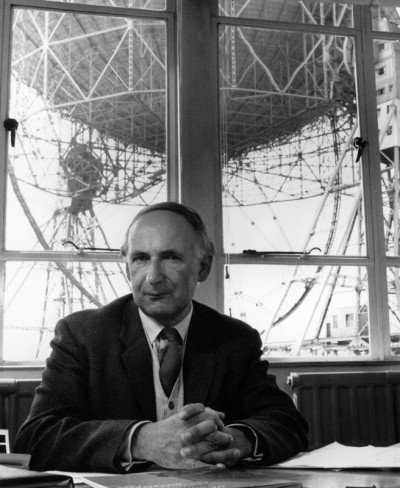Sir Bernard Lovell (Bernard Lovell)

Lovell was born at Oldland Common, Bristol in 1913, the son of Gilbert and Emily Laura Lovell. His childhood hobbies and interests included cricket and music – mainly the piano. He attended Kingswood Grammar School, now King’s Oak Academy. Lovell studied physics at the University of Bristol obtaining a bachelor of science degree in 1934, and a PhD in 1936 on the electrical conductivity of thin films. At this time he also received lessons from Raymond Jones, a teacher at Bath Technical School and later organist at Bath Abbey. The church organ was one of the main loves of his life, apart from science. He worked in the cosmic ray research team at the University of Manchester until the outbreak of World War II, during which he worked for the Telecommunications Research Establishment (TRE) developing radar systems to be installed in aircraft, among them H2S, for which he received an OBE in 1946.
He attempted to continue his studies of cosmic rays with an ex-military radar detector unit, but suffered much background interference from the electric trams on Manchester’s Oxford Road. He moved his equipment to a more remote location, one which was free from such electrical interference, and where he established the Jodrell Bank Observatory, near Goostrey in Cheshire. It was an outpost of the University’s botany department. In the course of his experiments, he was able to show that radar echoes could be obtained from daytime meteor showers as they entered the Earth’s atmosphere and ionised the surrounding air. With University funding, he constructed the then-largest steerable radio telescope in the world, which now bears his name – the Lovell Telescope. Over 50 years later, it remains a productive radio telescope, now operated mostly as part of the MERLIN and European VLBI Network interferometric arrays of radio telescopes.
In 1958, Lovell was invited by the BBC to deliver the annual Reith Lectures, a series of six radio broadcasts called The Individual and the Universe, in which he examined the history of enquiry into the solar system and the origin of the universe. In 1959, he was invited to deliver the MacMillan Memorial Lecture to the Institution of Engineers and Shipbuilders in Scotland. He chose the subject ‘Radio Astronomy and the Structure of the Universe’. Lovell was knighted in 1961 for his important contributions to the development of radio astronomy, and has a secondary school named after him in Oldland Common, Bristol, which he officially opened. A building on the QinetiQ site in Malvern is also named after him.
In 2009, Lovell spoke of a claimed assassination attempt in Deep-Space Communication Center (Eupatoria) during the Cold War where the Soviets allegedly tried to kill him with a lethal radiation dose. At the time, Lovell was head of the Jodrell Bank space telescope that was also being used as part of an early warning system for Soviet nuclear attacks. Lovell wrote a full account of the incident, to be published only after his death. Lovell was a member of the Royal Swedish Academy of Sciences. The first name of the fictional scientist Bernard Quatermass, the hero of several BBC Television science-fiction serials of the 1950s, was chosen in honour of Lovell. Physically very frail, Lovell lived in quiet retirement in the English countryside, surrounded by music, his books and a vast garden filled with trees he himself planted many decades before. Lovell died at home in Cheshire on 6 August 2012.
Born
- August, 31, 1913
- Oldland Common, Bristol, England
Died
- August, 06, 2012
- Swettenham, Cheshire, England
Cemetery
- St Peter Churchyard
- Cheshire, England




